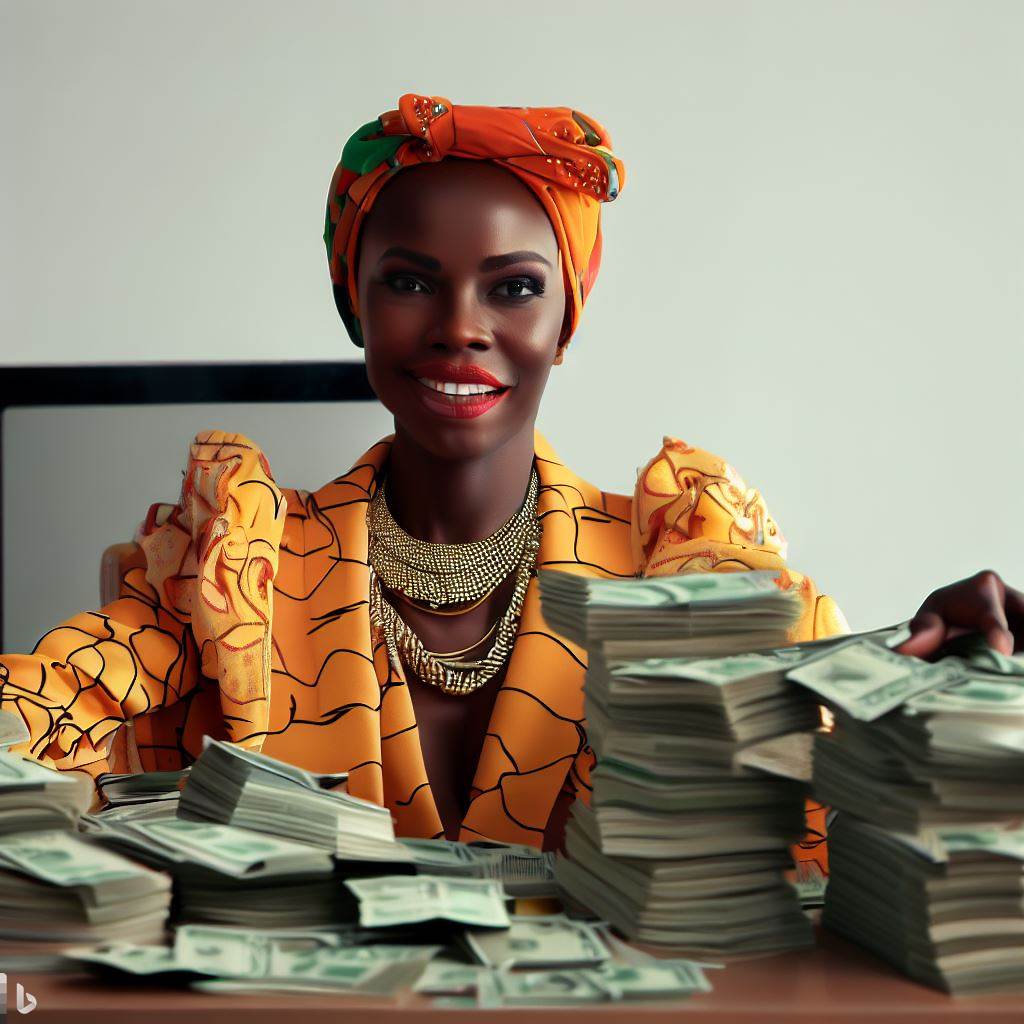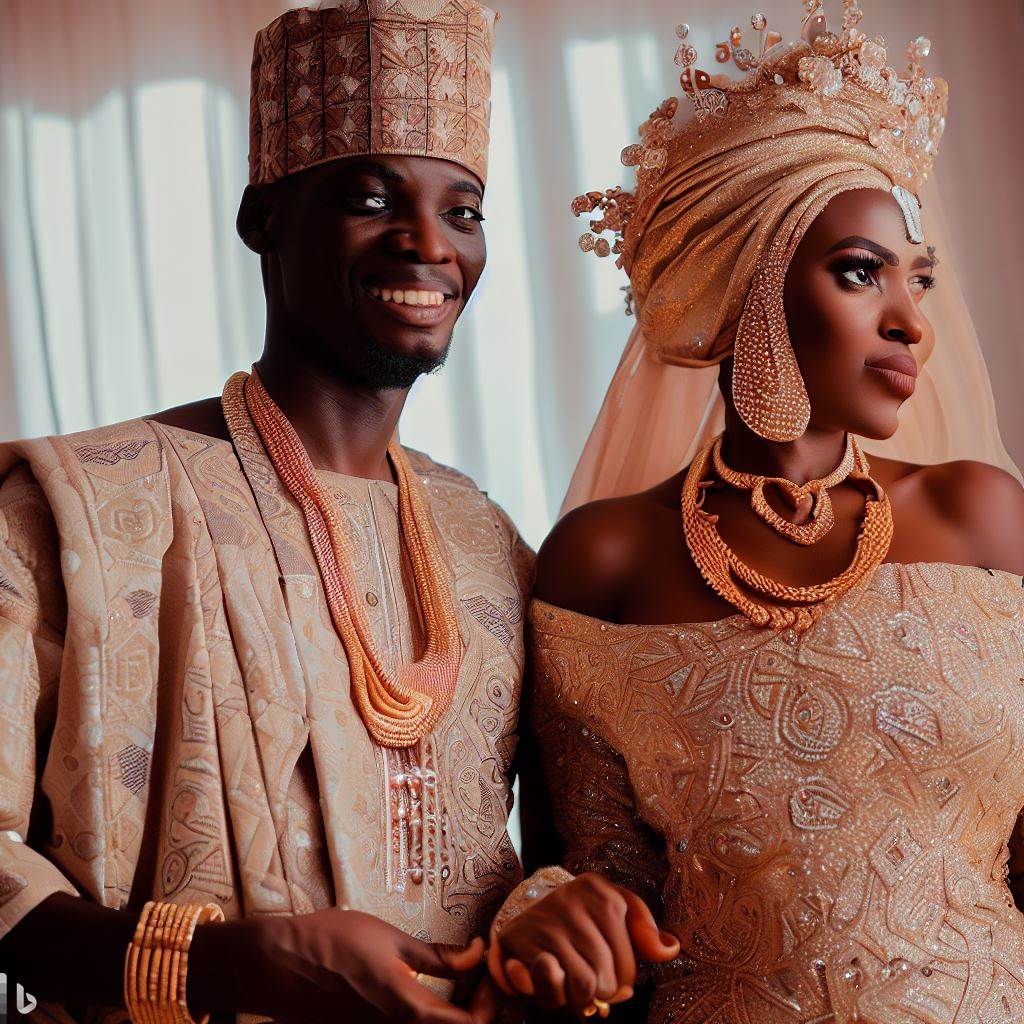Introduction
A. The Vibrant Nigerian Fashion Industry
Nigeria’s fashion scene reflects its diverse culture, blending tradition and modernity with unique flair.
B. Significance of Grasping Designer Salaries
- Insight into Economic Landscape: Understanding designer salaries reveals economic trends and market dynamics.
- Career Aspirations: Aspiring designers gauge earning potential and plan their paths wisely.
- Industry Growth Monitoring: Salary shifts mirror industry growth, attracting talent and investment accordingly.
In this section, we delve into Nigeria’s fashion sector and its designers’ earnings, uncovering invaluable insights.
Overview of the Fashion Industry in Nigeria
A. Growth and popularity of Nigerian fashion
- Nigeria’s fashion industry has experienced significant growth in recent years.
- The fashion industry in Nigeria has gained popularity both locally and internationally.
- Nigerian fashion designers have become renowned for their creativity and unique styles.
- Traditional Nigerian textiles and patterns have also contributed to the popularity of Nigerian fashion.
- The rise of social media has played a crucial role in promoting Nigerian fashion to a global audience.
- Nigerian fashion shows and events have attracted international attention and collaborations.
- The industry has generated employment opportunities for many individuals in Nigeria.
B. Emerging Nigerian fashion designers
- There is a growing number of talented emerging fashion designers in Nigeria.
- Young Nigerian designers are bringing fresh perspectives and innovative designs to the industry.
- These designers have been able to showcase their work through various platforms and fashion events.
- Many emerging Nigerian fashion designers have gained recognition and accolades internationally.
- Nigerian fashion schools and institutions have played a significant role in nurturing and training young designers.
- These designers are diversifying the Nigerian fashion scene by incorporating new styles and techniques.
- They are also incorporating sustainability and ethical practices into their designs.
Basically, the fashion industry in Nigeria has experienced substantial growth and popularity.
Nigerian fashion designers have gained recognition globally for their creativity and unique styles.
The industry has also provided employment opportunities for many individuals in Nigeria.
Additionally, there are numerous emerging fashion designers who are bringing fresh perspectives and innovation to the industry.
These designers are gaining recognition both locally and internationally, and they are diversifying the Nigerian fashion scene.
With the continued growth and support, the future of the Nigerian fashion industry looks promising.
Read: How to Start a Fashion Design Business in Nigeria
Factors Determining Fashion Designer Salaries in Nigeria
A fashion designer’s salary in Nigeria is influenced by various factors, including:
A. Experience and reputation
- A designer’s experience in the industry plays a significant role in determining their salary.
- Established designers with a proven track record are likely to command higher salaries.
- Reputation is crucial, as designers who are well-known and respected can charge premium prices.
- Gaining experience and building a strong reputation takes time and effort.
B. Location and target market
- The location of a fashion designer can impact their salary.
- In major cities like Lagos and Abuja, there is a higher demand for fashion designers, leading to better pay.
- Target market also matters, as designers catering to high-end clients tend to earn more.
- Designers operating in popular tourist destinations may also earn higher salaries due to increased demand.
C. Educational background and training
- A fashion designer’s educational background and training can influence their earning potential.
- Having a degree or diploma in fashion design from a reputable institution can lead to better job prospects and higher salaries.
- Ongoing professional development and attending fashion workshops can enhance a designer’s skills, leading to higher pay.
- Designers who continuously update their knowledge about emerging trends are more likely to be valued by clients.
D. Clientele and brand value
- The type of clientele a fashion designer attracts can impact their salary.
- Designers working with high-profile celebrities, politicians, or influential individuals can command higher fees.
- Building a strong personal brand and creating a unique design aesthetic can increase a designer’s value.
- Successful branding efforts, including effective marketing and social media presence, can lead to higher salaries.
It is important to note that these factors are not mutually exclusive and often overlap.
For example, a designer with extensive experience and a strong reputation may attract high-end clientele and operate in a prime location.
Additionally, the fashion industry is highly competitive, and designers should continuously work on improving their skills, building relationships, and enhancing their brand to increase their earning potential.
Understanding these factors and how they influence fashion designer salaries in Nigeria is essential for aspiring designers and those already in the industry.
Read: Challenges and Rewards of Fashion Design in Nigeria
Average salaries of fashion designers in Nigeria
A. Range of salaries in the industry
- Fashion designers in Nigeria earn varying salaries, depending on factors such as experience, location, and clientele.
- Salaries can range from ₦30,000 ($75) to ₦500,000 ($1,250) per month, or even higher for established designers.
- Entry-level designers may start with salaries between ₦30,000 ($75) and ₦70,000 ($175), while experienced designers can earn up to ₦200,000 ($500) per month.
B. Salaries based on experience level
- Junior fashion designers with less than two years of experience may earn between ₦30,000 ($75) and ₦50,000 ($125) per month.
- Mid-level designers with two to five years of experience can expect salaries ranging from ₦70,000 ($175) to ₦150,000 ($375) per month.
- Senior fashion designers with more than five years of experience can earn between ₦150,000 ($375) and ₦200,000 ($500) per month.
C. Salaries based on location
- Salaries of fashion designers can also be influenced by their location within Nigeria.
- Designers in major cities like Lagos and Abuja generally earn higher salaries compared to those in smaller towns or rural areas.
- The cost of living in these cities is higher, and fashion designers often cater to wealthier clientele, resulting in higher incomes.
- Fashion designers in Lagos and Abuja can earn salaries that exceed ₦200,000 ($500) per month, especially if they work for renowned fashion houses.
Generally, the average salaries of fashion designers in Nigeria vary based on different factors.
The range of salaries in the industry spans from ₦30,000 ($75) to ₦500,000 ($1,250) per month, with established designers earning even higher.
Salaries are determined by experience levels, with junior designers earning between ₦30,000 ($75) and ₦50,000 ($125) per month, while senior designers can earn up to ₦200,000 ($500) per month.
Additionally, location plays a role, as fashion designers in major cities like Lagos and Abuja tend to earn higher salaries due to catering to wealthier clientele and the higher cost of living.
Overall, fashion design can offer a lucrative career in Nigeria, with potential for growth and increased earning potential.
Read: Fashion Design in Nigeria: A Career with Global Impact

Challenges Faced by Fashion Designers in Nigeria
Fashion designers in Nigeria face various challenges in their line of work, which can hinder their success and profitability.
These challenges include limited market opportunities, counterfeit products, intellectual property theft, and high competition.
A. Limited Market Opportunities
- Limited target audience: Fashion designers in Nigeria often struggle to find a large target audience due to the limited purchasing power of the majority of the population.
- Lack of infrastructure: The fashion industry in Nigeria lacks the necessary infrastructure, such as adequate retail spaces and exhibition centers, which makes it difficult for designers to showcase their work effectively.
- Limited fashion events: There is a scarcity of fashion events, such as fashion weeks and trade shows, where designers can display their creations and attract potential customers.
- Minimal fashion media coverage: The fashion industry in Nigeria does not receive as much media coverage as in other countries, making it challenging for designers to gain exposure and recognition.
B. Counterfeit Products and Intellectual Property Theft
- Cheap imitations: Fashion designers in Nigeria often face the issue of cheap imitations flooding the market, which affects their sales and brand reputation.
- Lack of copyright protection: The fashion industry in Nigeria suffers from a lack of effective copyright laws and enforcement, exposing designers to intellectual property theft.
- Copycat culture: Many designers in Nigeria face the constant threat of their designs being copied by other fashion brands, negatively impacting their innovation and creativity.
- Infringement on Nigeria’s cultural heritage: Some designers exploit traditional Nigerian designs without giving credit to the original creators, which hampers the preservation of the country’s cultural heritage.
C. High Competition
- Saturated market: The Nigerian fashion industry is highly competitive, with a large number of designers vying for limited consumer attention and resources.
- Established international brands: International fashion brands have a strong presence in Nigeria, making it challenging for local designers to compete on a global scale.
- Price sensitivity: Nigerian consumers are often price-sensitive, which puts pressure on designers to offer affordable products, impacting their profit margins.
- Limited access to finance: Many fashion designers in Nigeria struggle to secure adequate funding and investment, limiting their ability to expand their businesses and compete effectively.
Essentially, fashion designers in Nigeria face significant challenges such as limited market opportunities, counterfeit products, intellectual property theft, and high competition.
Overcoming these obstacles requires the implementation of stronger copyright laws, increased market support, and the promotion of Nigerian fashion on both national and international platforms.
By addressing these challenges, the Nigerian fashion industry can thrive and contribute to the country’s economic growth and cultural identity.
Read: Becoming a Fashion Designer in Nigeria: A Beginner’s Guide
Explore Further: How to Start as a Production Designer in Nigeria
Strategies to Increase Fashion Designer Salaries in Nigeria
A. Building a Strong Brand Identity
- Create a unique and identifiable brand that sets you apart from other fashion designers.
- Invest in quality materials, craftsmanship, and attention to detail to establish your brand’s reputation.
- Collaborate with influencers and celebrities to increase brand visibility and credibility.
- Participate in fashion shows, events, and exhibitions to showcase your designs and build brand recognition.
- Create a consistent brand image through well-designed logos, packaging, and marketing materials.
B. Expanding to International Markets
- Research and identify potential international markets with a demand for Nigerian fashion designs.
- Adapt your designs to cater to the preferences and cultural nuances of the target international market.
- Establish partnerships with local retailers, boutiques, and online platforms to distribute your products internationally.
- Attend international trade fairs and fashion weeks to network with buyers and showcase your designs.
- Invest in online marketing and e-commerce platforms to reach international customers directly.
C. Leveraging Social Media and Digital Marketing
- Create a strong online presence through social media platforms such as Instagram, Facebook, and Twitter.
- Regularly update your social media accounts with high-quality images of your designs, fashion inspirations, and behind-the-scenes content.
- Engage with your followers through comments, direct messages, and collaborations with influencers.
- Utilize targeted online advertising to reach a wider audience and increase brand awareness.
- Collaborate with fashion bloggers and YouTubers to leverage their online following and promote your designs.
By implementing these strategies, fashion designers in Nigeria can significantly increase their salaries.
Building a strong brand identity will differentiate them from competitors and attract loyal customers.
Expanding to international markets will open up more opportunities and increase revenue potential.
Leveraging social media and digital marketing will enhance brand visibility and reach a global audience.
With dedication and persistence, fashion designers in Nigeria can achieve higher salaries and success in the industry.
Read: Exploring Fashion Designer Salaries in Nigeria 2024
Conclusion
A. Recap of key points discussed
In this post, we delved into the salaries of fashion designers in Nigeria and explored the factors that influence their earnings.
We discussed how experience, skills, reputation, and geographical location impact a fashion designer’s income.
We also highlighted the importance of networking, building a strong portfolio, and staying updated on the latest industry trends and market demands.
B. Encouragement for aspiring fashion designers in Nigeria
If you’re an aspiring fashion designer in Nigeria, don’t be discouraged by the uncertainty of the industry.
With hard work, determination, and a passion for creativity, you can succeed and achieve your dream.
Make sure to continuously improve your skills, seek opportunities for growth, and build a strong professional network.
C. Importance of staying updated on industry trends and market demands
In the fast-paced world of fashion, it is crucial to stay in tune with the latest trends and consumer preferences.
By following fashion blogs, attending fashion events, and conducting market research, you can adapt your designs to meet the demands of the market.
Keeping up with industry trends will not only enhance your creative abilities, but also increase your chances of success in the highly competitive fashion industry.
Remember, the key to becoming a successful fashion designer in Nigeria is to stay passionate, innovative, and adaptable.




